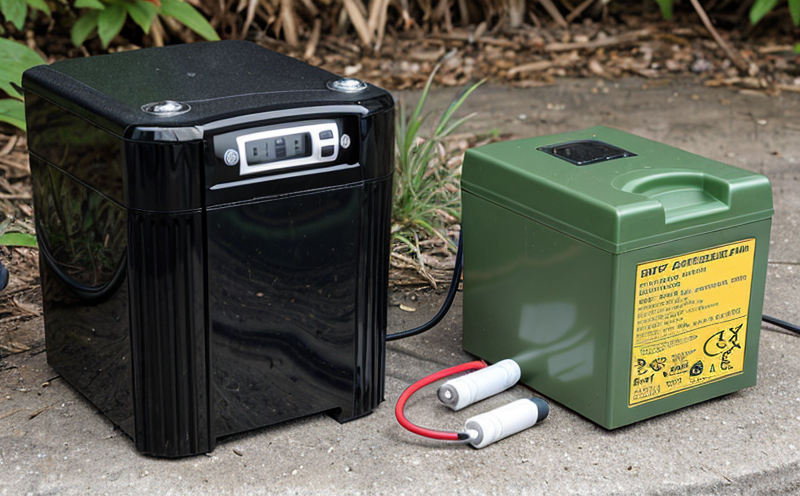Testing the Life Cycle of Rechargeable Batteries in Environmental Equipment
Testing the Life Cycle of Rechargeable Batteries in Environmental Equipment A Crucial Laboratory Service for Businesses
In todays fast-paced and increasingly environmentally conscious world, businesses are under pressure to reduce their ecological footprint while maintaining efficiency and productivity. One often-overlooked area that can significantly contribute to this goal is the management of rechargeable batteries used in environmental equipment. At Eurolab, we offer a comprehensive laboratory service designed specifically for this purpose Testing the Life Cycle of Rechargeable Batteries in Environmental Equipment.
This critical service allows businesses to understand how their rechargeable batteries are performing over time, thereby optimizing battery life, reducing waste, and minimizing costs associated with frequent replacements. In this article, we will delve into the importance of testing the life cycle of rechargeable batteries, highlight its numerous advantages, and address frequently asked questions about this laboratory service.
What is Testing the Life Cycle of Rechargeable Batteries in Environmental Equipment?
Testing the life cycle of rechargeable batteries involves a series of scientific tests designed to evaluate how these batteries perform under various conditions over an extended period. This process helps businesses understand factors such as
Cycle Count How many charge/discharge cycles can a battery endure before its capacity starts to degrade?
Capacity Loss What percentage of the original capacity is lost after each cycle, and at what rate does this occur?
Self-Discharge Rate How quickly do batteries lose their charge when not in use, and how does this impact overall performance?
Aging Effects Are there any specific factors that contribute to battery degradation, such as temperature fluctuations or exposure to moisture?
By understanding these aspects of a rechargeable batterys life cycle, businesses can make informed decisions about equipment maintenance, replacement schedules, and waste management strategies.
Advantages of Using Testing the Life Cycle of Rechargeable Batteries in Environmental Equipment
Eurolabs laboratory service offers numerous benefits for businesses
Extended Battery Life By understanding how to maintain peak performance, batteries last longer, reducing the need for frequent replacements.
Cost Savings With optimized battery life, businesses can save money on replacement costs and minimize waste management expenses.
Improved Efficiency Efficient equipment operation directly translates into increased productivity and reduced operational costs.
Enhanced Reliability Regular testing ensures that critical environmental equipment is reliable and functional when needed most.
Reduced Waste By identifying the optimal replacement schedule, businesses can significantly reduce battery waste and minimize their ecological footprint.
Key Benefits at a Glance
Improved Energy Efficiency Reduced energy consumption due to optimized battery performance.
Enhanced Equipment Uptime Fewer equipment failures and downtime resulting from inefficient batteries.
Simplified Maintenance Scheduling Regular testing informs replacement schedules, streamlining maintenance operations.
Compliance with Regulations Demonstrate adherence to environmental regulations by minimizing waste and optimizing resource usage.
Frequently Asked Questions
At Eurolab, we understand the importance of providing clear information about our laboratory services. Below are answers to common questions regarding Testing the Life Cycle of Rechargeable Batteries in Environmental Equipment
Q What types of batteries can be tested?
A Our service is applicable to all rechargeable battery types used in environmental equipment, including lead-acid, nickel-cadmium (Ni-Cd), nickel-metal hydride (NiMH), and lithium-ion (Li-ion) batteries.
Q How long does the testing process take?
A The duration of testing varies depending on the specific requirements of your battery type and the depth of analysis desired. However, most tests can be completed within 1-3 months.
Q What are the costs associated with this service?
A Pricing is based on the complexity of the test, the number of samples submitted, and the level of detail required in the report. We offer customized quotes for each project.
Q Can you provide recommendations for improving battery performance or extending life cycle?
A Yes! Based on our testing results, we can offer actionable advice and suggestions to optimize your rechargeable batteries performance and extend their lifespan.
Q Is the data collected and analyzed confidential?
A Absolutely! All data submitted for analysis remains confidential, in compliance with industry standards and legal requirements.
Conclusion
At Eurolab, we are dedicated to providing businesses with the tools necessary to optimize their environmental equipment and reduce their ecological footprint. Testing the life cycle of rechargeable batteries is a crucial service that can significantly contribute to these goals. By understanding how your rechargeable batteries perform over time, you can make informed decisions about equipment maintenance, replacement schedules, and waste management strategies.
Contact us today to learn more about this laboratory service and take the first step towards optimizing your businesss environmental efficiency.




